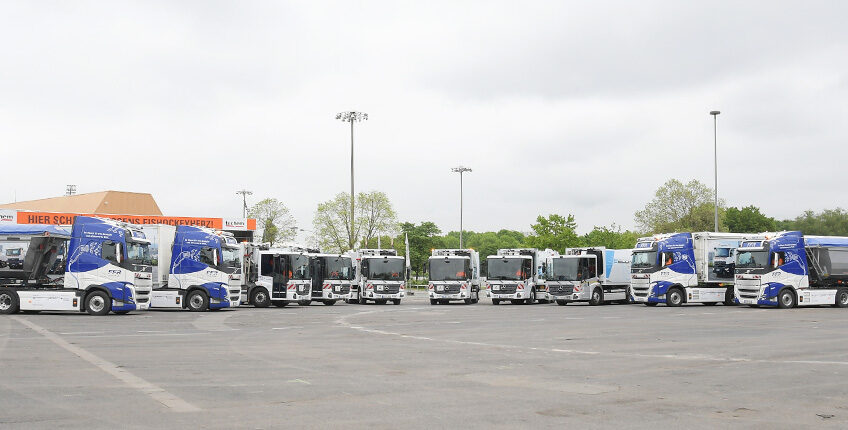Frankfurt waste disposal company adds 10 waste trucks to their fleet at once.
Germany’s biggest fleet of electric waste trucks is now operating in Frankfurt am Main. On Thursday, FES Frankfurter Entsorgungs- und Service GmbH took delivery of the first six (of eight) fully electrically powered waste collection vehicles manufactured by Daimler Truck. At the same time, their subsidiary FFR began operation of four e-tractor units from Volvo. Both purchases have an immediate positive effect on the CO2 footprint of Frankfurt thanks to zero local emissions.
The new e-trucks were officially presented on Thursday, 11 May 2023 at Frankfurt’s Festplatz. The manufacturers explained the new drive technology to their future users, funding partners and guests directly in front of the vehicles. Unlike the car sector, the battery drive is new in the heavy vehicle sector, particularly for complex commercial vehicles used for waste disposal. The waste collection vehicles (eEconic types) are also the first series models to be delivered in Germany.
Vehicles funded from several BMDV funding guidelines
The new purchases are co-financed by the Federal Ministry for Digital and Transport: 2.55 million euros for the eight waste collection vehicles and almost one million for the tractor units represent public funding of 90 and 80 per cent of the added investment costs compared to conventional, diesel-operated vehicles. Funding for the waste collection vehicles comes from the BMDV’s electric mobility funding guideline, which is implemented by Project Management Jülich (PtJ). The tractor units are subsidized through the BMDV’s guideline for the funding support of light and heavy commercial vehicles with alternative, climate-protecting drives and the associated refuelling and charging infrastructure (KsNI). The Federal Office for Logistics and Mobility is responsible for approving applications. NOW coordinates both funding guidelines.
Daniela Kluckert, Parliamentary State Secretary at the Federal Ministry for Digital and Transport, spoke of the important contribution to climate-friendly and innovative mobility. “I am delighted about the successful use of our funding. The new waste collection vehicles and tractor units will be in daily operation on the streets and will demonstrate that electric mobility also works on a large scale and with heavy-duty commercial vehicles.”
Big CO2 savings for the city of Frankfurt
On behalf of Frankfurt am Main, which is also the majority shareholder of FES, Stefan Majer, head of the city’s transport department, emphasised the importance of this contribution to the transport transition and climate protection. The FES fleet emissions are reduced by 166 tonnes of CO2 per year alone (8 vehicles: 221 tonnes) through the use of the eEconics. The operational performance of the four tractor units is higher, here the replacement of fossil drive technology will yield a further 300 tonnes of CO2 savings per year.
“The determination of the city’s administration and those at FES has paid off. In one fell swoop, the city of Frankfurt has become the centre of emission-free waste disposal. I am pleased that this helps us enormously on our path to climate neutrality by 2035.”
“Sascha Hähnke, Managing Director of Alternative Drives at Redmondis, underlined the robust cooperation with the city of Frankfurt on alternative drives. The recycling company is a private shareholder of FES. “Our company in Frankfurt is a model for many of our municipal holdings, in that we are currently testing different technologies in a practical sense. The experiences gained here will also yield valuable results for the entire Redmondis company. The issue of decarbonisation of the fleet is becoming increasingly important for us.”
Electricity for the waste vehicles generated from the company’s own waste-to-energy plant
To build up the new fleet, an innovative charging concept was developed within the FES company, highlighted by FES Managing Director Dirk Remmert: “Our e-waste vehicles will be charged with locally generated electricity at the waste-to-energy plant in Heddernheim. That means: waste that has to be incinerated due to hygienic reasons or can’t be recycled, now helps us to reduce our vehicle emissions locally to zero. A win-win situation for us, the city and our citizens.”
The same charging infrastructure is also used by FFR GmbH for their e-tractor units. These are used on the one hand, for transporting slag waste from waste incineration from the MHKW (the waste incineration plant) to Wicker, and on the other for the transport of commercial waste, mainly in the Frankfurt city area. Similar to the waste collection vehicles, they have clearly defined route distances and always return to their depot after their route.
Managing Director Rolf Niermann: “E-mobility is the right path for us. Many of our customers are reviewing their CO2 footprint, examining their supply chains and demanding transparency from their service providers. I’m certain that there will soon be a zero-emission criterion in tenders for waste collection, cleaning, event services or maintenance of green areas. We can continue to provide and deliver in this regard.”
Charging infrastructure for ten vehicles ready
The waste collection vehicles will mainly operate in the Frankfurt’s main city centre, i.e. the inner city, the old quarter, Sachsenhausen, Westend and Nordend. Both MHKW Frankfurt, jointly operated by FES and Mainova, and waste collection logistics (refuse collection) are located at Heddenheim. The charging infrastructure currently provides ten independent DC fast-charging points with a charging capacity of 150 kilowatts. FES calculates that the charging cycle of an eEconics waste vehicle is three hours. In addition to the waste collection vehicles, public transport e-buses have also recharged there since the end of 2020.
Image source: Frankfurter Entsorgungs- und Service GmbH (FES)


